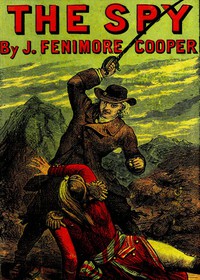The Spy, James Fenimore Cooper [uplifting book club books TXT] 📗

- Author: James Fenimore Cooper
Book online «The Spy, James Fenimore Cooper [uplifting book club books TXT] 📗». Author James Fenimore Cooper
Everything in the American camp announced an approaching struggle. At a distance of a few miles, the sound of cannon and musketry was heard above the roar of the cataract. The troops were soon in motion, and a movement made to support the division of the army which was already engaged. Night had set in before the reserve and irregulars reached the foot of Lundy’s Lane, a road that diverged from the river and crossed a conical eminence, at no great distance from the Niagara highway. The summit of this hill was crowned with the cannon of the British, and in the flat beneath was the remnant of Scott’s gallant brigade, which for a long time had held an unequal contest with distinguished bravery. A new line was interposed, and one column of the Americans directed to charge up the hill, parallel to the road. This column took the English in flank, and, bayoneting their artillerists, gained possession of the cannon. They were immediately joined by their comrades, and the enemy was swept from the hill. But large reenforcements were joining the English general momentarily, and their troops were too brave to rest easy under the defeat. Repeated and bloody charges were made to recover the guns, but in all they were repulsed with slaughter. During the last of these struggles, the ardor of the youthful captain whom we have mentioned urged him to lead his men some distance in advance, to scatter a daring party of the enemy. He succeeded, but in returning to the line missed his lieutenant from the station that he ought to have occupied. Soon after this repulse, which was the last, orders were given to the shattered troops to return to the camp. The British were nowhere to be seen, and preparations were made to take in such of the wounded as could be moved. At this moment Wharton Dunwoodie, impelled by affection for his friend, seized a lighted fusee, and taking two of his men went himself in quest of his body, where he was supposed to have fallen. Mason was found on the side of the hill, seated with great composure, but unable to walk from a fractured leg. Dunwoodie saw and flew to the side of his comrade, saying,—
“Ah! dear Tom, I knew I should find you the nearest man to the enemy.”
“Softly, softly; handle me tenderly,” replied the lieutenant. “No, there is a brave fellow still nearer than myself, and who he can be I know not. He rushed out of our smoke, near my platoon, to make a prisoner or some such thing, but, poor fellow, he never came back; there he lies just over the hillock. I have spoken to him several times, but I fancy he is past answering.”
Dunwoodie went to the spot, and to his astonishment beheld the aged stranger.
“It is the old man who knew my mother!” cried the youth. “For her sake he shall have honorable burial; lift him, and let him be carried in; his bones shall rest on native soil.”
The men approached to obey. He was lying on his back, with his face exposed to the glaring light of the fusee; his eyes were closed, as if in slumber; his lips, sunken with years, were slightly moved from their natural position, but it seemed more like a smile than a convulsion which had caused the change. A soldier’s musket lay near him; his hands were pressed upon his breast, and one of them contained a substance that glittered like silver. Dunwoodie stooped, and removing the limbs, perceived the place where the bullet had found a passage to his heart. The subject of his last care was a tin box, through which the fatal lead had gone; and the dying moments of the old man must have passed in drawing it from his bosom. Dunwoodie opened it, and found a paper in which, to his astonishment, he read the following:—
“Circumstances of political importance, which involve the lives and fortunes of many, have hitherto kept secret what this paper now reveals. Harvey Birch has for years been a faithful and unrequited servant of his country. Though man does not, may God reward him for his conduct!”
GEO. WASHINGTON.
It was the SPY OF THE NEUTRAL GROUND, who died as he had lived, devoted to his country, and a martyr to her liberties.
End of the Project Gutenberg EBook of The Spy, by James Fenimore Cooper




Comments (0)